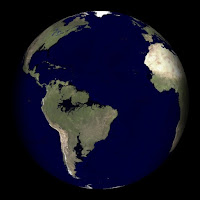
(Post Apocalypse) Teenage Tetley lives in a human settlement (one of the last) built on a miles-wide floating garbage dump. She explains why everyone hates her now. (8,800 words; Time: 29m)
Rating: ★★★★☆ Recommended
Recommended By: RHorton:4 JStrahan"The Future Is Blue," by Catherynne M. Valente [bio] (edited by Jonathan Strahan), appeared in Drowned Worlds (RSR review), published on July 12, 2016 by Solaris.
Mini-Review (click to view--possible spoilers)
Pro: The story appears to be an allegory, in which Garbagetown represents our whole world, and each of the separate communities represents different cultures. Dry land is the promise of another world humanity might move to. It's a myth, but people believe in it, so she stops them from wasting their scarce resources on trying to find it.
There are numerous clever touches in this story. Each village has its own character, uniquely determined by the sort of garbage it specializes in. In the electric town, even the different types of batteries are sorted. There are no solar cells or windmills--only gasoline--because this represents our world of today, and our world runs on fossil fuels.
The message, buried inside the allegory, is that we have to learn to solve our problems here on Earth; we cannot run away from them.
 Con: If you don't buy the allegory argument, this story defies science and common sense. You could melt every bit of ice in the world, and the sea level would only rise 80 meters, as illustrated in the image to the left.
Con: If you don't buy the allegory argument, this story defies science and common sense. You could melt every bit of ice in the world, and the sea level would only rise 80 meters, as illustrated in the image to the left.
It's hard to feel sorry for Tetley. She takes it upon herself to make this huge decision for everyone in Garbagetown, even though her only source of information is a storyteller she met in a peepshow. Unable to win the argument, she just uses violence.
Other Reviews: Search Web, GoodReads.com
Catherynne M. Valente Info: Interviews, Websites, ISFDB, FreeSFOnline
There are numerous clever touches in this story. Each village has its own character, uniquely determined by the sort of garbage it specializes in. In the electric town, even the different types of batteries are sorted. There are no solar cells or windmills--only gasoline--because this represents our world of today, and our world runs on fossil fuels.
The message, buried inside the allegory, is that we have to learn to solve our problems here on Earth; we cannot run away from them.
 Con: If you don't buy the allegory argument, this story defies science and common sense. You could melt every bit of ice in the world, and the sea level would only rise 80 meters, as illustrated in the image to the left.
Con: If you don't buy the allegory argument, this story defies science and common sense. You could melt every bit of ice in the world, and the sea level would only rise 80 meters, as illustrated in the image to the left.It's hard to feel sorry for Tetley. She takes it upon herself to make this huge decision for everyone in Garbagetown, even though her only source of information is a storyteller she met in a peepshow. Unable to win the argument, she just uses violence.
Other Reviews: Search Web, GoodReads.com
Catherynne M. Valente Info: Interviews, Websites, ISFDB, FreeSFOnline
Now at Clarkesworld with a podcast:
ReplyDeletehttp://clarkesworldmagazine.com/valente_03_19_reprint/